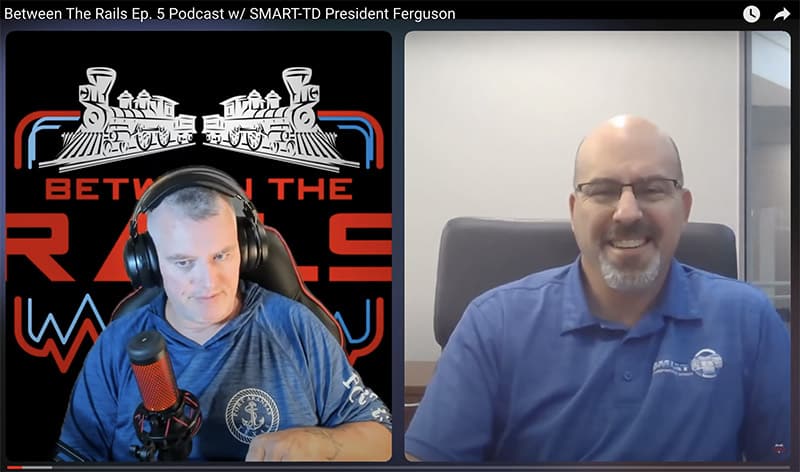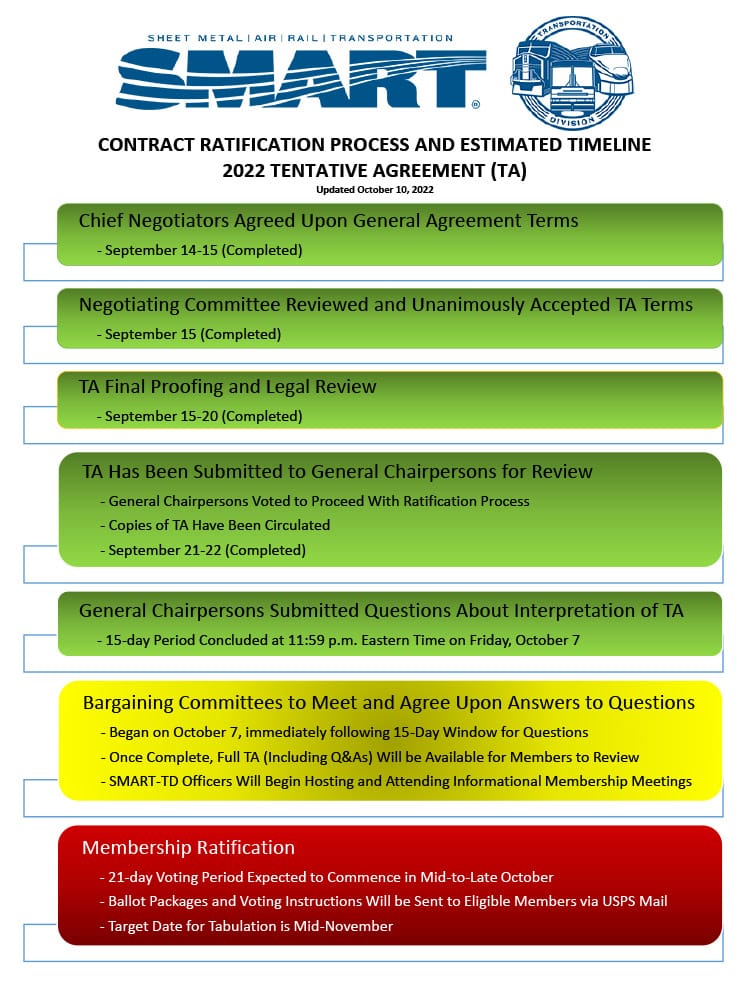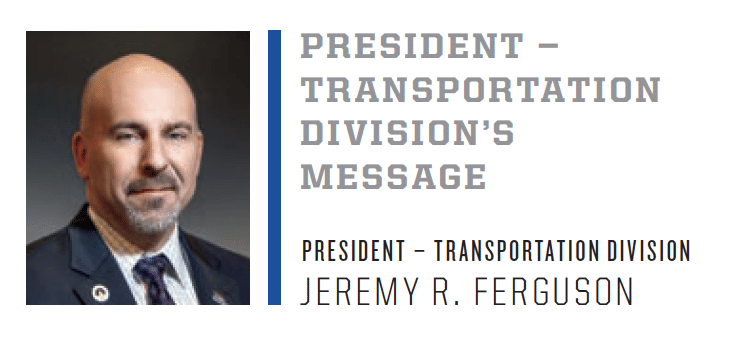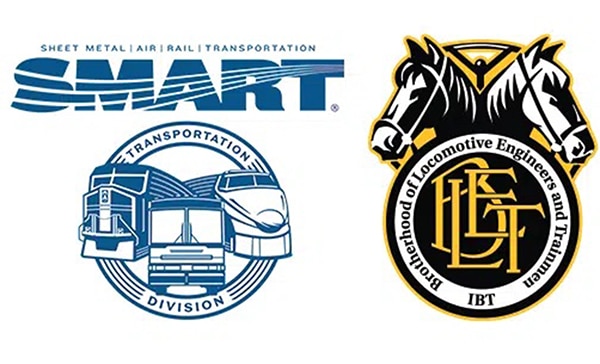For the first time in more than 30 years, this Union has taken the Railway Labor Act (RLA) to its limits. We negotiated. We mediated. We cooled off. We went all the way to a Presidential Emergency Board (PEB) and then back into a cooling-off period again. The coordinated bargaining group was tasked with obtaining the best benefits possible, and we never stopped fighting.
I understand the desire amongst many of you to strike. I know the contempt the carriers treat you with at work and have faced it in negotiations. I agree that this nation needs to know and understand just how poorly you and your families are being treated by America’s Class I railroads. You sacrificed every day for the last several years in the face of this disregard for the sake of your families, your communities and this nation. Working through the pandemic, you endured as critical essential infrastructure workers. You put your health and safety on the line to ensure the world continued to function uninterrupted.
Our supply chain remained intact because of your efforts. How did the carriers respond? With nothing more than “labor doesn’t contribute to profits.” It is clear from not only their words, but also their actions that their sole focus was and still is to satisfy Wall Street investors and their constant desire to maximize profits.
In the face of all this, why did we not strike? It is not due to the RLA, but rather because of the commerce clause contained within the Constitution of the United States of America. The fact is, Congress would not risk any more harm to the supply chain than what the railroads have already committed since the advent of Precision Scheduled Railroading (PSR). We were then faced with an ugly reality. We could refuse to negotiate any further and initiate the strike procedures, which, in turn, would have been blocked by Congress with the PEB imposed upon us, or we could come to a tentative agreement that then gives you a voice in these proceedings through a direct up or down vote. Beyond empowering each and every member in the process, the agreement opens new ground and cracks open the door to attendance policies being negotiated at the table, instead of through unilateral edicts from the carriers.
The fact is, Congress would not risk any more harm to the supply chain than what the railroads have already committed since the advent of Precision Scheduled Railroading (PSR). We were then faced with an ugly reality. We could refuse to negotiate any further and initiate the strike procedures, which, in turn, would have been blocked by Congress with the PEB imposed upon us, or we could come to a tentative agreement that then gives you a voice in these proceedings through a direct up or down vote. Beyond empowering each and every member in the process, the agreement opens new ground and cracks open the door to attendance policies being negotiated at the table, instead of through unilateral edicts from the carriers.
From the beginning, it was clear that the carriers had no intent of negotiating in good faith. Their primary goal was to break our crew-consist agreements and force crew reductions upon us. In their list of items they wished to accomplish in negotiations (Section 6 notices) they included pay concessions from members so that you would actually have money taken away from you if their objective of single-person crews was rejected. Similarly, their proposed general wage increases (GWI) were a meager 11% with a tiered health care system that would subject you to a monthly premium (moving goal post) that was dependent upon their current health factors, the number of dependents in their respective households, and, in addition, drastic increases to deductibles and out-of-pocket expenses.
Needless to say, there was nothing gained during the early stages of negotiations. While you were hard at work risking your health and safety, the carriers were warm and cozy with the shareholders enjoying record profits while sitting quiet at the table, arms folded and with icy glares blanketly rejecting every proposal we put forth. We demanded our fair share, as you have seen in our published Section 6 Notices. They were absolutely unwilling to negotiate at any point. As a result, and after almost three years of the carriers’ stonewalling, the National Mediation Board (NMB) ordered the parties to mediation.
During mediation, the political climate became more influential, as the elected representatives who would eventually have oversight of our dispute were known to be more labor friendly. This caused the railroads’ bargaining unit to slightly loosen its position, which resulted in their new offer of a 16% GWI (a raise they coined – “reasonable”), but they still maintained their positions on drastic healthcare and work rule changes. Clearly, this fell well short of being acceptable, so we held strong, maintained our position and continued the battle.
Eventually, the parties were released from mediation because it was abundantly clear the carriers were not willing to engage in a conversation, much less meaningful negotiations, and given that we were at a standstill and making zero progress, the cooling-off period commenced.
The carriers drew their line in the sand from the very beginning and claimed that, in their opinion, your demands were excessive and undeserved. We had no other choice but to prepare for a strike; and that’s exactly what we did throughout the cooling-off period. While they were busy courting Wall Street and putting up smoke and mirrors to hide from their own customers and the Surface Transportation Board (STB), we were busy preparing for the first strike in more than 30 years.
The carriers drew their line in the sand from the very beginning and claimed that, in their opinion, your demands were excessive and undeserved. We had no other choice but to prepare for a strike; and that’s exactly what we did throughout the cooling-off period. While they were busy courting Wall Street and putting up smoke and mirrors to hide from their own customers and the Surface Transportation Board (STB), we were busy preparing for the first strike in more than 30 years.
Given your value and worth to this nation as the backbone of America’s economy, President Biden enacted his right, according to the RLA, to impose a PEB in a last-ditch effort for the two sides to reach an amicable agreement. The PEB appointments were publicly named, and given who was selected, we maintained faith that they would have labor’s best interests in mind.
The preparation for the PEB was immediate. Much like court, despite only having three jurors (PEB appointees) as opposed to the standard 12, we prepared to make three years’ worth of arguments in a five-day period. We stretched those days for everything we could to wage our strongest arguments for the highest priority of issues. This included a 28% GWI, no healthcare changes, 15 paid sick days, three additional holidays, a voluntary five-day work week for road service, scope rule and vacation pay changes for our yardmasters, and the abolishment of their egregious attendance policies. The carriers, of course, made all their standard rebuttal arguments on why you shouldn’t be entitled to any of our proposals, and what they wanted to gain from this process.
From day one of negotiations, we never backed down, and we never conceded to any of the items the carriers were demanding. Without question, we knew our only chance at success was to stand united and be willing to go the full distance under the RLA. Had any Union achieved or agreed to a tentative agreement prior to the PEB, it would have most likely established a potentially harmful precedence, which, historically, leaves the remaining unions to face that pattern as the most likely PEB recommendation.
Eventually, PEB 250 concluded and its jury made their ruling. Immediately it was clear the recommendations fell short. The quality-of-life issues we had fought so hard to achieve were negated, namely sick leave and the invalidation of attendance policies. Given that the additional holidays and sick leave were not included, the recommended wage increases should have been greater, and we had sound testimony to support it. The coalition hired an expert economist, and he clearly expressed what was needed in the form of an agreement to recruit and retain an adequate and talented workforce. Our stance was ignored, and the PEB members decided to meet both parties somewhere, theoretically, in the middle.
While this outcome fell short of our expectations, they did rule against the carriers’ proposal to force our crew-consist negotiations into an expedited arbitration (within six months of continued mediation), in addition to denying any forfeiture of pay raises where conductors remain in the cab of a locomotive. The board also rejected the railroads’ proposal for drastic changes to our healthcare plans which would have had long-term financial impacts on the members when they or their dependents received medical care or preventative exams. We were also successful with our position to achieve much-needed changes to the healthcare plan with respect to speech therapy, Autism Spectrum Disorder and an increase in hearing benefits.
While this outcome fell short of our expectations, they did rule against the carriers’ proposal to force our crew-consist negotiations into an expedited arbitration (within six months of continued mediation), in addition to denying any forfeiture of pay raises where conductors remain in the cab of a locomotive.
Additionally, the PEB recommended our position for rest days, but in doing so, commingled this into their decision with the carriers’ demand to implement automatic bids (ABS) and self-supporting pools (SSP) (with modifications to pool/extra board regulations). I want to be very clear that neither SMART-TD nor the BLE-T argued in support of the ABS or SSP. Unfortunately, these were two items that the carriers were successful in receiving, along with the return of the 15% monthly contribution for healthcare premiums.
Following the PEB, it was clear the carriers were not happy with what they had received. This proved to be detrimental to our collective bargaining process as the recommendation would serve as the foundation for any possible agreement moving forward. The carriers were adamant that we would not receive anything more than what was contained within the PEB, period! While most of the other Unions accepted the recommendation as written, we were determined to get more, we dug in, did not waver and continued the fight.
My objective during this time was two-fold; prepare for a national strike and negotiate additional benefits for our members in excess of the PEB recommendations. As a leader, this decision was tough. I had just as many members telling me they wanted to vote on the recommendation as I did that wanted to strike. In addition, I do not agree with, nor will be party to any attempt to restrict your right to vote. You sacrificed too much to not have a say in this process.
So, we pressed on until the 12th hour, when the political powers made it clear, regardless of what was portrayed in the media, that we would not be allowed to shut down America’s supply chain. In the final hours, we were successful in obtaining more, in spite of the headwinds and all who stated it was not possible.
In the final hours, we were successful in obtaining more, in spite of the headwinds and all who stated it was not possible.
As President of this Union, I will not sell members on this tentative agreement. It is my responsibility and duty to provide you with factual information and allow you to make an educated choice, based on the facts presented, that serves you and your family’s interest. Further, it would have been reckless of me to put your fate in the hands of politicians who know very little of the plight of a modern railroad worker in today’s PSR environment. Therefore, as it should be, the vote is now yours. No matter what your collective decision is, I will work to ensure it is heard and is acted upon.
In solidarity,
Jeremy Ferguson,
President — Transportation Division



